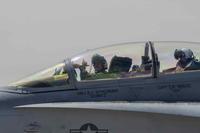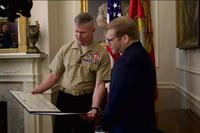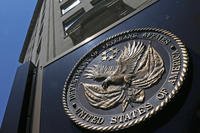Just as the pendulum of conflict appears to swing decisively in the direction of irregular warfare, counterinsurgency and “stability operations,” the Russians have to go and confound things by rolling armored columns into Georgia led by that most iconic of conventional war weapons, the T-72, and conduct a traditional air campaign with front line bombers and ballistic missiles. How quickly things change.
The brief conflict in Georgia was a classic force-on-force engagement of the type some in the U.S. military have long yearned for so they can put into practice their “core competencies.” From all reports, Georgian military performance was lacking, hampered by poor logistics, communications problems and a senior general who reportedly fled the battle. Most units scattered ahead of the advancing Russian armored columns.
Vice President Dick Cheney is currently visiting Georgia and has vowed continued U.S. support, although the official line is that the U.S. is providing only humanitarian and economic assistance, for the moment anyway. A report this week in the New York Times says Georgia is intent on rebuilding and upgrading its military, and is hoping for U.S. equipment and training.
The U.S. military has been advising and equipping the Georgian military for some time. I saw Georgian soldiers over in Iraq and they appeared competent enough. The American officers I talked to who worked alongside them there held them in high regard. So what, if anything, does the Georgian military performance say about the training we provided? Did we train the Georgians for the wrong type of war, too much irregular war focus and not enough big battle emphasis?
I put that question to Joint Chiefs Chairman Adm. Michael Mullen last week. His answer: “First of all, we do the training that the Georgian government decides they want, and that's really what we were doing. And I'm not sure, just based on the preponderance of [the Russian] force that, a different kind of training or, saying we weren't focused in the right area -- it was a significant force and I'm not sure it would have made much difference.”
According to U.S. Army Lt. Col. Robert Hamilton, a military fellow at CSIS, and former chief of the Office of Defense Cooperation at the American embassy in Tiblisi, the Russian 58th Army that invaded Georgia was one of Russia’s premier combat formations and greatly outnumbered the Georgian military. He writes in a commentary that Georgia’s ground forces consist of just four combat brigades. The bulk of one was in Iraq when the invasion began and another was being trained by U.S. advisers for an Iraq rotation. The Georgians had few troops in position to counter the Russian point of attack.
Hamilton writes, “Past U.S. military assistance to Georgia was not designed to equip it for war with Russia. Instead, it was designed initially to give the Georgian military the capability to rid its territory of Chechen militants Russia claimed were using it to rearm and refit, and later to train it in counter-insurgency operations as Georgian forces began to take on a significant role in Iraq.” He says the U.S. “deliberately” avoided training the Georgians for conventional warfare as it would be seen as too provocative.
Since we’re clearly going to have a role in equipping and training the “new” Georgian military, it makes sense to ask what adjustments should be made in that assistance going forward. Mullen said our military-to-military engagement has been stepped up in the wake of the Russian attack, but that it remains up to the Georgians as to how they want to develop their military in the future.
Hamilton offers some advice in that regard. He says the Russian action has actually made the job easier as the U.S. no longer has to worry about providing Georgia assistance that may be seen as too provocative. The focus, he says, should be on building up Georgia’s command and control systems, an integrated air defense, a maritime defense, artillery counter battery systems and a “highly-lethal anti-armor capability.” Also, the U.S. must continue to train Georgian forces in counterinsurgency so they can deploy alongside U.S. forces in Iraq or Afghanistan in the future.
A defense analyst I spoke with, who advises American ground forces, said to rebuild the Georgian military along conventional lines might be the wrong approach. Instead he suggested a different force model, that of Hezbollah. What Hezbollah did so effectively, as was shown in the 2006 Lebanon war, was combine modern weaponry with a distributed infantry force that fought in guerrilla fashion. Fighting as distributed networks, Hezbollah rarely presented an inviting target for Israeli air and artillery attack, but their well trained tactical units were able to swarm at the point of attack of Israeli armored incursions and hit the Israelis hard with precision anti-tank weaponry.
Equipped with top-shelf anti-armor systems, such as the U.S. Dragon and Javelin and the Russian-built RPG-29 and AT-14 Kornet, such a force would perhaps better be able to exploit Georgia’s mountainous and urbanized terrain against channelized Russian armored columns than a conventionally organized combat brigade, as Hezbollah did in south Lebanon. The lessons from the initial Russian incursion into Grozny in 1994 are instructive as well. Fighting in small tactical teams organized around close range anti-armor weapons, the Chechens savaged Russian tank columns.
Many in the U.S. military view such “hybrid” opponents, loosely organized, highly motivated infantry networks equipped with advanced weaponry, as the most challenging threat American troops may face in a future war. As the U.S. military ponders how to increase the combat power of the Georgian military to better defend itself against possible future Russian attacks, the Hezbollah model might be one to emulate. One thing the U.S. military cannot provide the Georgian military, and what Hezbollah had in spades and greatly increased their effectiveness, was very high discipline and motivation. The Georgians will have to come up with that on their own.








